Use Portable VMware Cloud Foundations (VCF) on Azure VMware Solution
This article discusses how to modernize your VMware workloads by bringing your portable VMware Cloud Foundations (VCF) to Azure VMware Solutions and take advantage of incredible cost savings as you modernize your VMware workloads. With Azure VMware Solution, you access both the physical infrastructure and the licensing entitlements for the entire VMware software-defined datacenter (SDDC) stack, including vSphere, ESXi, NSX networking, NSX Firewall, and HCX. With the new VCF subscription portability option, you can apply your on-premises VCF entitlements, purchased from Broadcom, directly to the Azure VMware Solution infrastructure. This flexibility means you can seamlessly integrate your VMware assets into a fully managed, state-of-the-art Azure environment, maximizing efficiency and cutting costs. Upgrade with confidence and experience the power and flexibility of Azure VMware Solution today!
What's changing?
Private Cloud on the portable VCF offering, must have prepurchase Firewall add-on from Broadcom along with the VCF subscription to use the vDefend Firewall on Azure VMware Solution. Prior to using the vDefend Firewall software on Azure VMware Solution ensure you register your Firewall add-on with Microsoft. For detailed instructions on how to register your portable VCF, see "Register your portable VCF with Azure VMware Solution" later in this article.
Important
Your portable VCF is applied at the host level and must cover all the physical cores on a host. For example, if each host in Azure VMware Solution has 36 cores and you intend to have a Private Cloud with 3 nodes, the portable VCF must cover 108 (3*36) cores. In the current version, if you want to use your own portable VCF on your Azure subscription for the Azure VMware Solution workloads, all the nodes (cores) in that subscription including multiple Private Clouds need to be purchased through Broadcom and covered under your Broadcom portable VCF contract. At the moment, you're required to bring portable VCF entitlements that cover cores for all the nodes deployed within your Azure subscription.
Purchasing VCF subscription portability offering on Azure VMware Solution
We offer three flexible commitments and pricing options for using your portable VCF on Azure VMware Solution. You can choose from pay-as-you-go, 1-year Reserved Instance (RI), and 3-year RI options. NOTE: 3-year RI option is discontinued for AV36 node type.
To take advantage of the Reserved Instance (RI) pricing for the portable VCF offering on Azure VMware Solution, purchase an RI under the Product Name- VCF BYOL. For example, if your private cloud uses AV36P nodes, you must purchase the Reserved Instance for the Product Name- AV36P VCF BYOL. To use the pay-as-you-go pricing for the portable VCF offering, you only need to register your VCF subscription.
Important
If you are converting your existing Azure VMware Solution private cloud to leverage the portable VCF pricing, you must ensure to exchange the existing Reserve Instance (RI) on your subscription to VCF BYOL RI. Unless you have RI under <node-type>-VCF BYOL, you will be charged the VCF BYOL pay-as-you-go pricing.
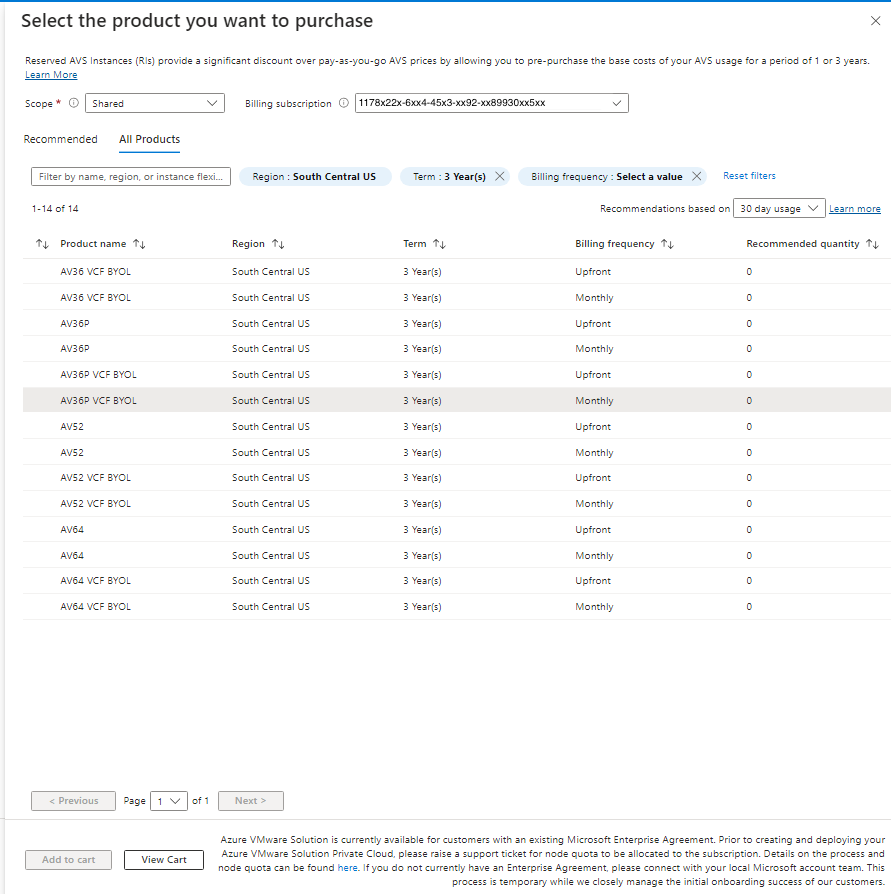
Request host quota with VCF subscription portability
Existing:
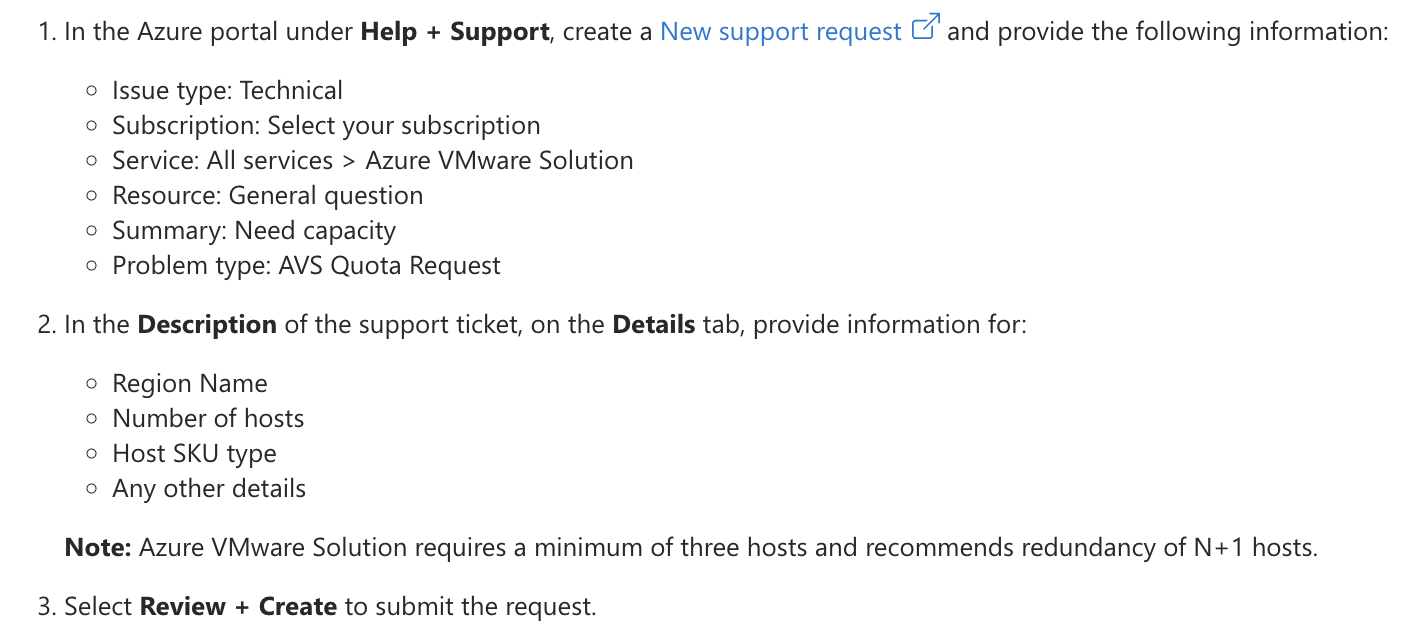
To request quota for portable VCF offering, provide the following additional information in the Description of the support ticket:
- Region Name
- Number of hosts
- Host SKU type
- Add the following statement as is, by replacing "N" with the "Number of VCF BYOL cores" you purchased from Broadcom for VCF portability to Azure VMware Solutions:
"I acknowledge that I have procured portable VCF subscription from Broadcom for "N" cores to use with Azure VMware Solutions." - Any other details, including Availability Zone requirements for integrating with other Azure services; for example, Azure NetApp Files, Azure Blob Storage
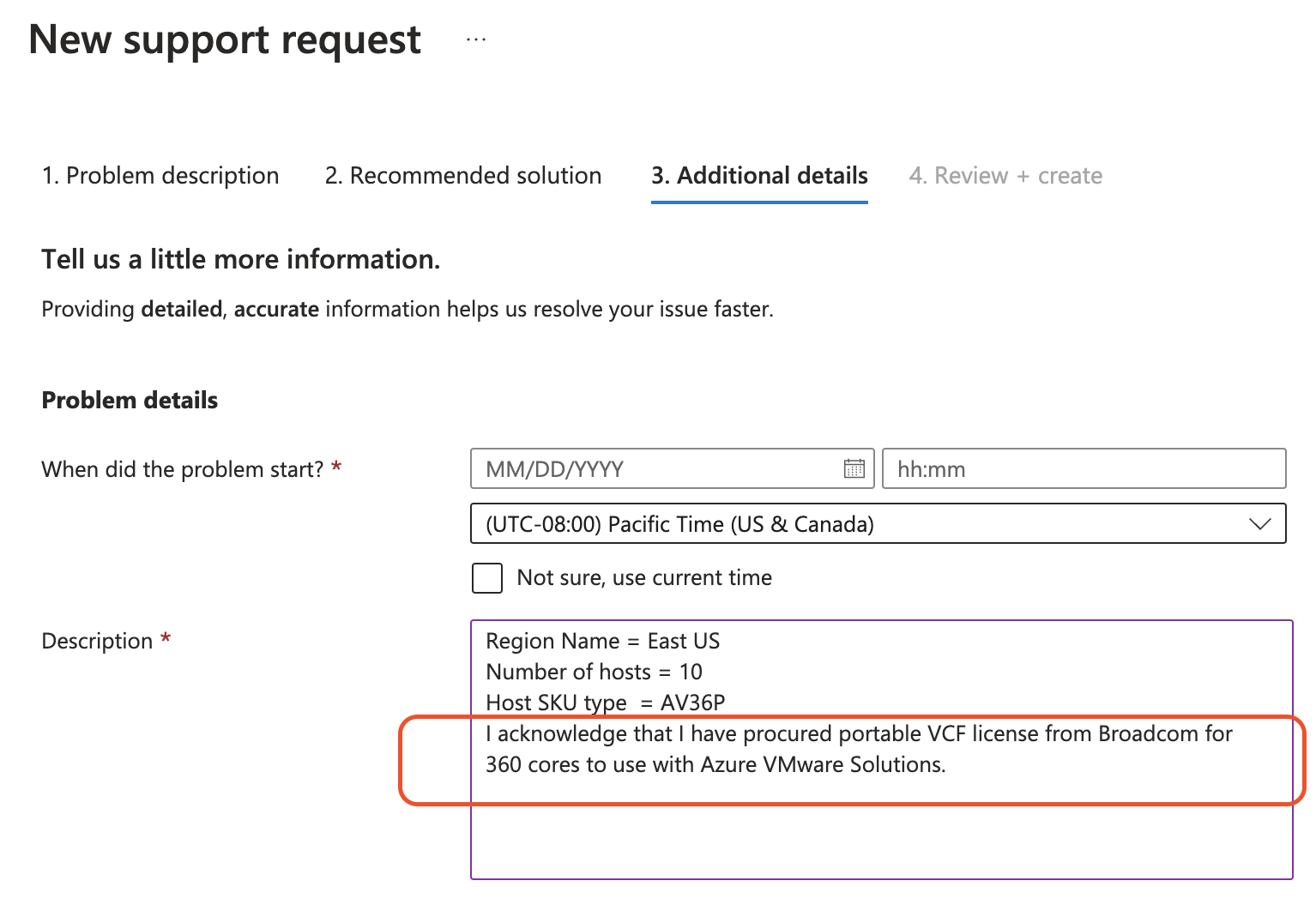
Note
Portable VCF is applied at the host level and must cover all the physical cores on a host. Hence, quota will be approved only for the maximum number of nodes which the portable VCF covers. For example, if you have purchased 1000 cores for portability and requesting for AV36P, you can get a maximum of 27 nodes quota approved for your subscription.
That is, 36 physical CPU cores per AV36P node. 27 nodes = 27*36 = 972 cores. 28 nodes = 28*36 = 1008 cores. If you have purchased 1000 cores for portability, you can only use up to 27 AV36P nodes under your portable VCF.
Register your portable VCF with Azure VMware Solution
To get your quota request approved, you must first register the portable VCF details with Microsoft. Quota will be approved only after the entitlements are provided. Expect to receive a response in 1 to 2 business days.
How to register the VCF subscription keys
Email your portable VCF entitlements (and VMware vDefender Firewall license entitlements if to enable vDefender Firewall on Azure VMware Solution) to the following email address: registeravsvcfbyol@microsoft.com.
VCF entitlement sample:

Note
The "Qty" represents the number of cores eligible for VCF portability. Your quota request should not surpass the number of nodes equivalent to your entitled cores from Broadcom. If your quota request exceeds the approved cores, the quota request will be granted only for the number of nodes that are fully covered by the entitled cores.
- VCF with VMware vDefend entitlement sample:

Sample Email to register portable VCF entitlements:
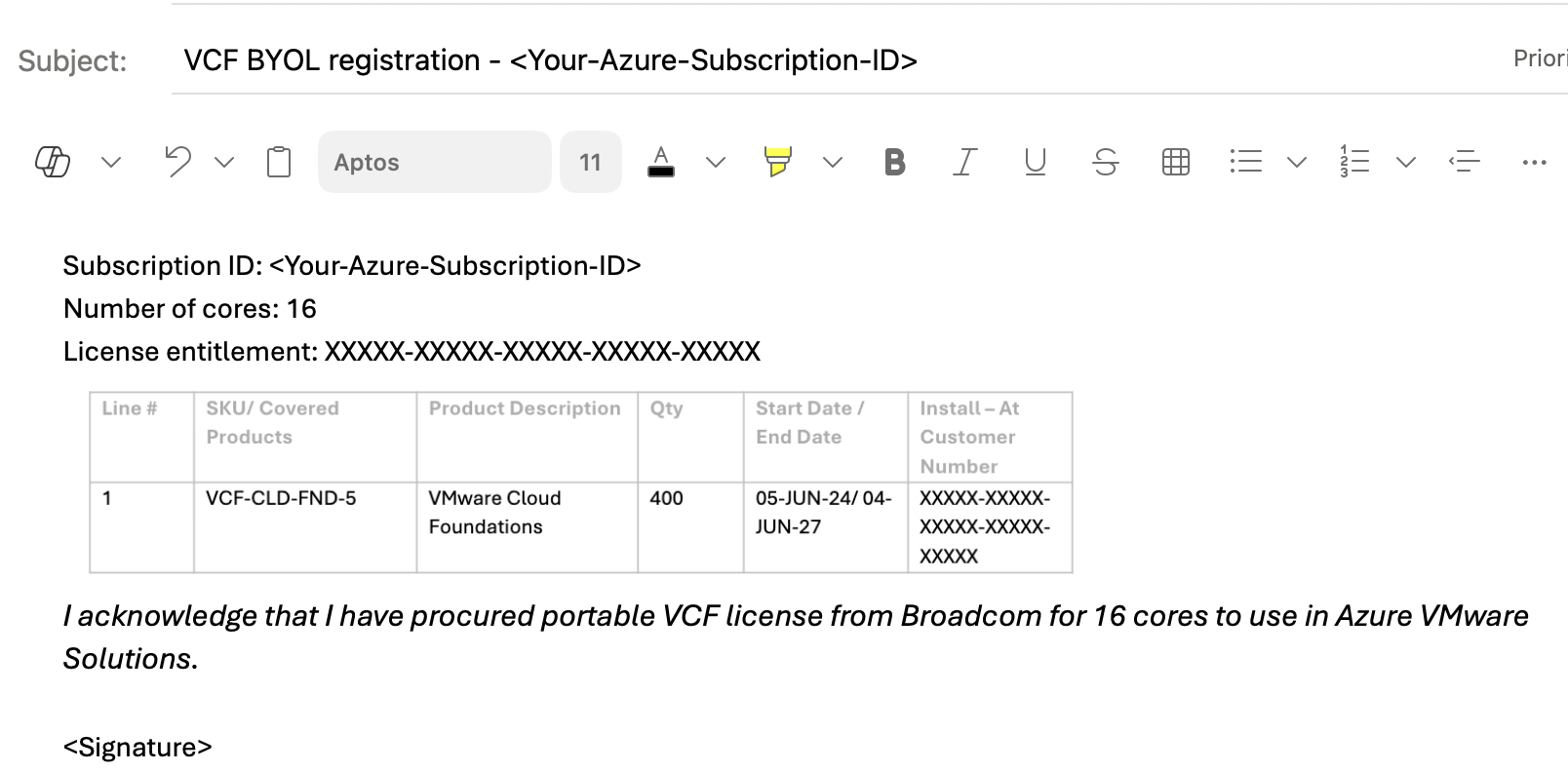
The VMware vDefend Firewall add-on CPU cores required on Azure VMware Solution depend on the planned feature usage:
- For NSX Distributed Firewall: same core count as VCF core count.
- For NSX Gateway Firewall, it would be 64 cores (with default NSX Edges).
- For both NSX Distributed and Gateway firewall, it should be combined core count of both.
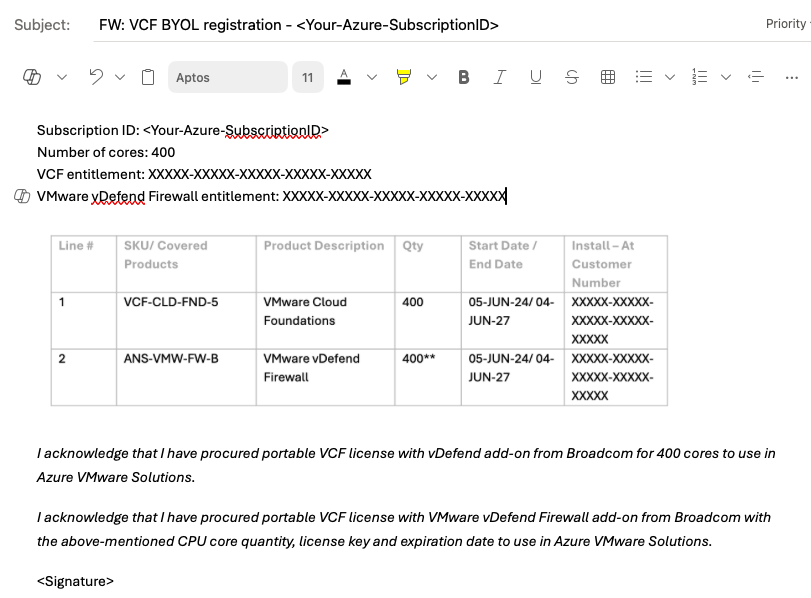
Note
The portable VCF entitlements submitted to Microsoft will be securely retained for our reporting purpose. You can request the permanent deletion of this data from Microsoft's systems at any time. Once the automated validation process is in place, your data will be automatically deleted from all Microsoft systems, which may take up to 120 days. Additionally, all your VCF entitlement data will be permanently deleted within 120 days any time you migrate to an Azure VMware Solution-owned VCF solution.
Creating/scaling a Private Cloud
You can create your Azure VMware Solution private cloud the same way as today regardless of your licensing method, that is, whether you bring your own portable VCF or use the Azure VMware Solution-owned VCF subscription. Learn more. Your decision of licensing is a cost optimization choice and doesn't affect your deployment workflow.
For example, you want to deploy 10 nodes of AV36P node type.
Scenario 1: "I want to purchase my VCF subscription from Broadcom and use the portable VCF offering on Azure VMware Solution."
- Create quota request for AV36P nodes. Declare your own VCF portable subscription intent and the number of cores you're entitled for portability.
- Register your VCF entitlements via email to Microsoft.
- Optional- to use the Reserved Instance pricing purchase AV36P VCF BYOL Reserved Instance. You can skip this step to use the pay-as-you-go pricing for the portable VCF.
- Create your Private Cloud with AV36P nodes.
Scenario 2: "I want to let Azure VMware Solution manage my VCF subscription for all my Azure VMware Solution private cloud."
- Create quota request for AV36P node type.
- Optional- Purchase AV36P Reserved Instance.
- Create your Private Cloud with AV36P nodes.
Moving between the two VCF licensing methods
If you're currently managing your own VCF subscription for Azure VMware Solution and wish to transition to Azure VMware Solution-owned VCF subscription, you can easily make the switch without any changes to your private cloud.
If you're an existing Azure VMware Solution customer and wish to transition to the portable VCF (VCF BYOL) offering, you can also easily make the switch without any changes to your private cloud deployments by registering your portable VCF entitlements with Microsoft.
Steps:
- Create a support request to inform us of your intent to convert.
- Exchange RI- If you have any active RI with VCF BYOL, exchange them for non-VCF BYOL RI. For instance, you can exchange your AV36P VCF BYOL RI for an AV36P or vice versa.
NOTE: If you have RIs for your current deployments, ensure to exchange RI for the right Product Name to continue to get the discounted RI pricing. Without this step, you will incur the pay-as-you-go cost.
Note
You need to purchase the portable VCF entitlements from Broadcom for all cores that match your current Azure VMware Solution deployment. For instance, if your Azure subscription has a private cloud with 100 AV36P nodes, you must purchase portable VCF for atleast 3600 cores from Broadcom to convert to VCF BYOL offering.
"Onboarding to portable VCF on Azure VMware Solution" Checklist
Scenario 1: "I am converting existing AVS private cloud to VCF BYOL."
- Get your portable VCF subscription from Broadcom.
- If you have an RI purchased, exchange the RI to the corresponding VCF BYOL RI.
- Register your portable VCF with Azure VMware Solution.
Scenario 2: "I am creating a new AVS private cloud with VCF BYOL."
- Get your portable VCF subscription from Broadcom.
- Request host quota for Azure VMware Solution.
- If you intend to leverage the RI pricing, purchase the RI under the "VCF BYOL" product name.
NOTE: If you register your portable VCF without this step, you will be charged BYOL pay-as-you-go pricing by default for your usage. To leverage the RI pricing, ensure the RI purchase under the right region, host count, and product name (VCF BYOL in this case).